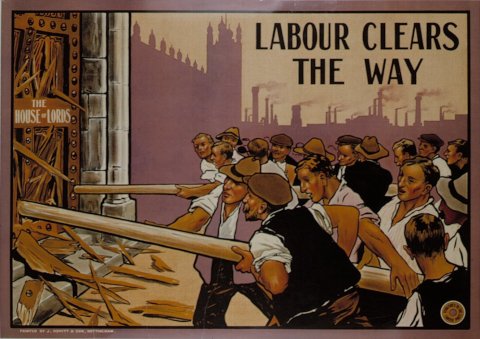Forward not Back was the inelegant slogan that helped Labour limp to victory in the 2005 General Election. Inelegant, but people broadly understood it. In the next few weeks, scarcely noticed outside Westminster, positions will begin to be taken on one of the longest-running issues in British politics, the future of the House of Lords – and for Labour, it is vital that it continues to be Forward, not Back.
Today, Labour peers publish their thoughts on what should happen next. They are, of course, well-placed to comment, but many of them also tussle with a conflict of interests. They understandably argue that they do an important job, which they do, but many also know that things cannot stay as they are. Their proposals for change are incremental and modest and should be supported, but they fail to make the case for a democratic second chamber and take us back from Labour’s long-term position.
I have an interest – as a member of Labour’s National Policy Forum I’ve been involved in the heated arguments on party policy on Lords reform through the last three policy cycles, at Exeter in 2000, at Warwick in February in 2004 and Warwick again in 2008. On behalf of the Campaign for a Democratic Upper House, a campaign run by Labour members for reform, I contacted hundreds of constituency Labour parties and was struck by the consistent strength of support for change. Nick Clegg’s botched attempts in this Parliament have muddied the waters for some Labour people. But, ask the public, and while it isn’t high on anyone’s priority list, there is little support for the current set-up. As politics fractures, whether we like it or not we are moving to a multi-party system, and something at Westminster has to give.

Labour should make a simple and clear manifesto commitment, reflecting party policy developed through the National Policy Forum, which in 2008 agreed “We have made proposals for a wholly or substantially elected House of Lords and are consulting on which electoral system will be used” and: “House of Lords reform has removed the majority of hereditary peers and we intend to continue reform until there are none and we will continue with our progressive and reforming agenda by moving to elections to a second chamber that will better reflect the nations and regions.”
That’s pretty clear, and the next National Policy Forum in a few months time is likely to reconfirm that position. No tinkering, no referendums, just a clear manifesto commitment which is then enacted by a Labour Government. Forward, not Back, colleagues!
Daniel Zeichner represents East of England CLPs on Labour’s National Policy Forum is Labour Parliamentary Candidate in Cambridge.




More from LabourList
‘Unity or division’: Starmer’s message to voters in Gorton and Denton
Almost half of Labour members oppose plans to restrict jury trials, poll finds
‘How Labour can finally fix Britain’s 5G problem’